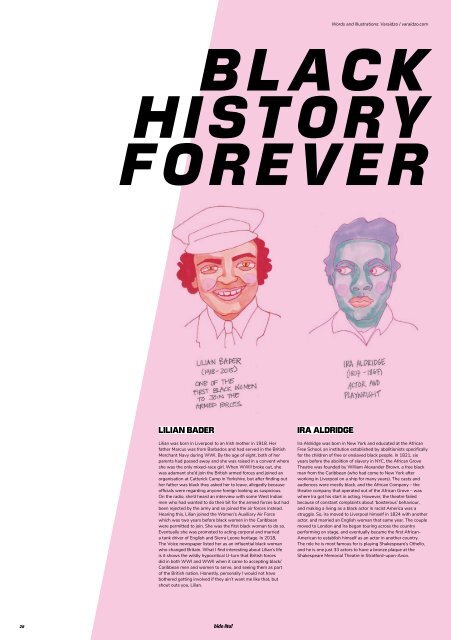Issue 95 / Dec18/Jan19
Dec 2018/Jan 2019 double issue of Bido Lito! magazine. Featuring: CHELCEE GRIMES, REMY JUDE ENSEMBLE, AN ODE TO L8, BRAD STANK, KIARA MOHAMED, MOLLY BURCH, THE CORAL, PORTICO QUARTET, JACK WHITE and much more.
Dec 2018/Jan 2019 double issue of Bido Lito! magazine. Featuring: CHELCEE GRIMES, REMY JUDE ENSEMBLE, AN ODE TO L8, BRAD STANK, KIARA MOHAMED, MOLLY BURCH, THE CORAL, PORTICO QUARTET, JACK WHITE and much more.
Create successful ePaper yourself
Turn your PDF publications into a flip-book with our unique Google optimized e-Paper software.
Words and Illustrations: Varaidzo / varaidzo.com<br />
BLACK<br />
HISTORY<br />
FOREVER<br />
LILIAN BADER<br />
Lilian was born in Liverpool to an Irish mother in 1918. Her<br />
father Marcus was from Barbados and had served in the British<br />
Merchant Navy during WWI. By the age of eight, both of her<br />
parents had passed away and she was raised in a convent where<br />
she was the only mixed-race girl. When WWII broke out, she<br />
was adamant she’d join the British armed forces and joined an<br />
organisation at Catterick Camp in Yorkshire, but after finding out<br />
her father was black they asked her to leave, allegedly because<br />
officials were regarding anyone foreign looking as suspicious.<br />
On the radio, she’d heard an interview with some West Indian<br />
men who had wanted to do their bit for the armed forces but had<br />
been rejected by the army and so joined the air forces instead.<br />
Hearing this, Lilian joined the Women’s Auxiliary Air Force<br />
which was two years before black women in the Caribbean<br />
were permitted to join. She was the first black woman to do so.<br />
Eventually she was promoted to acting corporal and married<br />
a tank driver of English and Sierra Leone heritage. In 2018,<br />
The Voice newspaper listed her as an influential black woman<br />
who changed Britain. What I find interesting about Lilian’s life<br />
is it shows the wildly hypocritical U-turn that British forces<br />
did in both WWI and WWII when it came to accepting black/<br />
Caribbean men and women to serve, and seeing them as part<br />
of the British nation. Honestly, personally I would not have<br />
bothered getting involved if they ain’t want me like that, but<br />
shout outs you, Lilian.<br />
IRA ALDRIDGE<br />
Ira Aldridge was born in New York and educated at the African<br />
Free School, an institution established by abolitionists specifically<br />
for the children of free or enslaved black people. In 1821, six<br />
years before the abolition of slavery in NYC, the African Grove<br />
Theatre was founded by William Alexander Brown, a free black<br />
man from the Caribbean (who had come to New York after<br />
working in Liverpool on a ship for many years). The casts and<br />
audiences were mostly black, and the African Company – the<br />
theatre company that operated out of the African Grove – was<br />
where Ira got his start in acting. However, the theatre failed<br />
because of constant complaints about ‘boisterous’ behaviour,<br />
and making a living as a black actor in racist America was a<br />
struggle. So, Ira moved to Liverpool himself in 1824 with another<br />
actor, and married an English woman that same year. The couple<br />
moved to London and Ira began touring across the country<br />
performing on stage, and eventually became the first African-<br />
American to establish himself as an actor in another country.<br />
The role he is most famous for is playing Shakespeare’s Othello,<br />
and he is one just 33 actors to have a bronze plaque at the<br />
Shakespeare Memorial Theatre in Stratford-upon-Avon.<br />
28


















